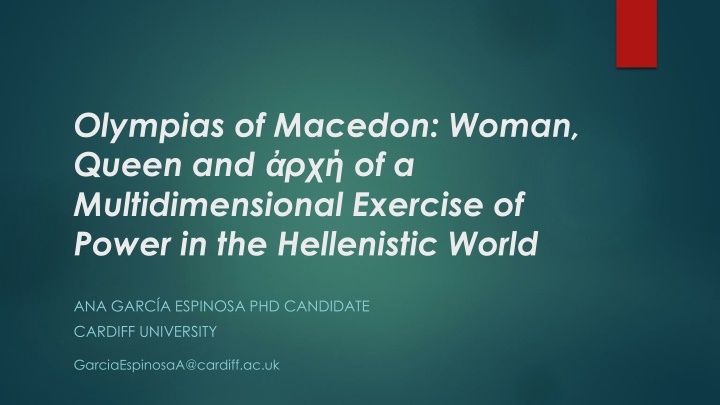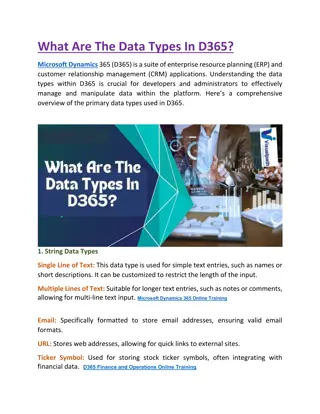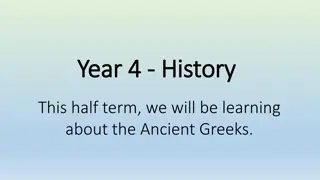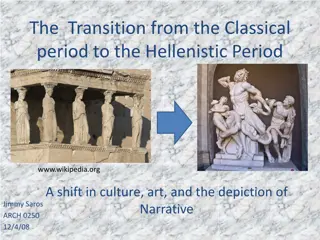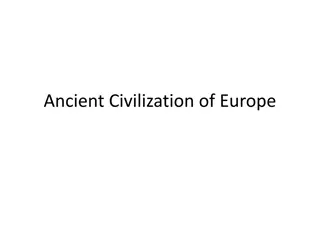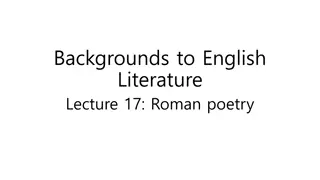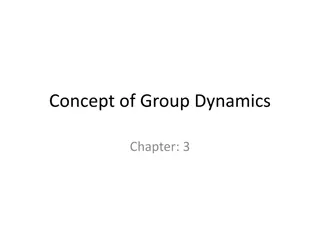Power Dynamics in the Hellenistic World: A Study of Olympias of Macedon
Exploration of power dynamics in the Hellenistic world through the multidimensional exercise of power by Olympias of Macedon. The study delves into various forms of power such as reward, coercive, legitimate, referent, and expert power, shedding light on their roles in shaping leadership and influence. Additionally, the concept of soft power and hard power is discussed, highlighting the ability to coerce versus attract in achieving desired outcomes.
Download Presentation

Please find below an Image/Link to download the presentation.
The content on the website is provided AS IS for your information and personal use only. It may not be sold, licensed, or shared on other websites without obtaining consent from the author.If you encounter any issues during the download, it is possible that the publisher has removed the file from their server.
You are allowed to download the files provided on this website for personal or commercial use, subject to the condition that they are used lawfully. All files are the property of their respective owners.
The content on the website is provided AS IS for your information and personal use only. It may not be sold, licensed, or shared on other websites without obtaining consent from the author.
E N D
Presentation Transcript
Olympias of Macedon: Woman, Queen and of a Multidimensional Exercise of Power in the Hellenistic World ANA GARC A ESPINOSA PHD CANDIDATE CARDIFF UNIVERSITY GarciaEspinosaA@cardiff.ac.uk
Reward Power it relies in the ability to reward (either with something tangible, such as money, or with something abstract, such as praise, responsibility or influence) Coercive power it stems from the expectation that there will be a punishment or negative outcome for an individual if they do not conform to something. Legitimate power it comes from internalised norms, values, or socially prescribed behaviour. It depends on: Cultural values. Acceptance of social structures. Designation by a legitimising agent. Referent power it resides on the identification with the person that is to exercise power, relying on a feeling of oneness or a desire for such an identity. Expert power its strength dwells on the extent of the knowledge (or the perception of such) within a certain area. French, J. R. P., Jr., & Raven, B. (1959). The bases of social power in D. Cartwright (Ed.), Studies in social power (pp. 150 167). University of Michigan. POWER
Soft power Hard power Ability to coerce. Ability to get what you want through attraction rather than coercion or payments. Hard power = military and economic might. Soft power = attractiveness (culture, political ideas, policies, etc.) Legitimate actions. Nye, J. S. Jr. (2006) Soft Power and European-American Affairs, in L. Ilgen (ed.) Hard Power, Soft Power and the Future of Transatlantic Relations (pp. 25 35). Ashgate: UK.
Referent of the example to be a good example for a group of individuals by showing how things should be done. Fear capacity to punish either physically or through other methods an individual or group of individuals. Tradition inherited authority, fame, or good reputation. Religion shared religious beliefs of a group of individuals or population for someone s authority. Persuasion/influence capacity to convince others to follow through one s charisma or a possible benefit for doing so. Education having what is considered a good education in the main fields of expertise of the considered period. Experience in the field where the claim for leadership is taking place. Management capacity of someone to proof that they are good at managing a diverse range of resources. LEADERSHIP
, , , , . ; Moreover, Olympias, as Eratosthenes says, when she sent Alexander forth upon his great expedition, told him, and him alone, the secret of his begetting, and bade him have purposes worthy of his birth. Others, on the contrary, say that she repudiated the idea, and said: Alexander must cease slandering me to Hera. Plut. Vit. Alex. 3.2, trans Bernadotte Perrin
, , , , . Such was the end of Olympias, who had attained to the highest dignity of the women of her day, having been daughter of Neoptolemus, king of the Epirotes, sister of the Alexander who made a campaign into Italy, and also wife of Philip, who was the mightiest of all who down to this time had ruled in Europe, and mother of Alexander, whose deeds were the greatest and most glorious Diod. Sic. 19.51.6, trans. Russel M. Geer
. When, however, the armies were drawn up facing each other, the Macedonians, out of respect for the position of Olympias and remembering the benefits that they had received from Alexander, changed their allegiance. Diod. Sic. 19.11.2-3, trans. Russel M. Geer
, , , . She says: I beg thee to find other ways of conferring favours on those thou lovest and holdest in honour; as it is, thou makest them all the equals of kings and providest them with an abundance of friends, whilst thyself thou strippest bare. Plut. Vit. Alex. 39.5, trans. Bernadotte Perrin
Olympias invited him to come and take charge of Alexander s little son and rear him, feeling that plots were laid against his life Plut. Vit. Eumenes, 13.1, trans. Bernadotte Perrin
, , , . And as for suspicions of poisoning, no one had any immediately, but five years afterwards, as we are told, upon information given, Olympias put many men to death, and scattered abroad the ashes of Iolas, alleging that he had administered the poison. Plut. Vit. Alex. 77.1, trans. Bernadotte Perrin
, . . , . She therefore sent to her a sword, a noose, and some hemlock, and ordered her to employ whichever of these she pleased as a means of death, neither displaying any respect whatever for the former dignity of the victim whom she was unlawfully treating, nor moved to pity for the fate that is common to all. Accordingly, when she herself met with a similar reversal, she experienced a death that was worthy of her cruelty. But by glutting her rage with such atrocities, she soon caused many of the Macedonians to hate her ruthlessness; for all of them remembered the words of Antipater, who, as if uttering a prophecy on his death bed, advised them never to permit a woman to hold first place in the kingdom Diod. Sic. 19.11.6-7; 9, trans. Russel M. Geer
() but he had little faith in Eumenes promises because of the latter s loyalty to Olympias and the kings; Diod. Sic. 19.44.2, trans. Russel M. Geer
, , 2 , . , , , . This oath Eumenes corrected and then submitted it to the Macedonians who were besieging him, requesting them to decide which was the juster form. Antigonus, namely, for form s sake, had mentioned the kingsat the beginning of the oath, and then had made the rest of it refer to himself; but Eumenes wrote at the head of the oath the names of Olympias and the kings, and proposed to swear fealty, not to Antigonus alone, but also to Olympias and the kings, and to have the same enemies and friends as they. Plut. Vit. Eumenes, 12.2, trans. Bernadotte Perrin
Angelina Jolie as Olympias in Alexander (2004) All the women of these parts were addicted to the Orphic rites and the orgies of Dionysus from very ancient times (being called Klodones and Mimallones), and imitated in many ways the practices of the Edonian women and the Thracian women about Mount Haemus, from whom, as it would seem, the word threskeuein came to be applied to the celebration of extravagant and superstitious ceremonies. Now Olympias, who affected these divine possessions more zealously than other women, and carried out these divine inspirations in wilder fashion, used to provide the revelling companies with great tame serpents, which would often lift their heads from out the ivy and the mystic winnowing-baskets,or coil themselves about the wands and garlands of the women, thus terrifying the men. Plut. Vit. Alex. 2.5-6, trans. Bernadotte Perrin
